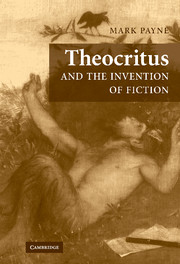Conclusion: The future of a fiction
Published online by Cambridge University Press: 22 September 2009
Summary
Εἶπέ τις ‘Ηράκλειτε, τεὸν μόρον, ἐς δέ με δάκρυ
ἤγαγεν ἐμνήσθην δ’ ὁσσάκις ἀμϕότεροι
ἥλιον ἐν λέσχῃ κατεδύσαμην. ἀλλὰ σὺ μέν που,
ξεĩν' 'ΑλικαρνησεŨ, ᾖτετράπαλαι σποδιή,
αἱ δὲ τεαὶ ζώουσιν ἀηδόνες, σιν ὁ πάντων
ἁρπακτὴς 'Αίδης οὐκ ἐπὶ χεĩρα βαλεĩ
Someone told me you were dead, Heraclitus, and it brought me to tears. I remembered how often the two of us, chatting, put the sun to bed. You, I suppose, my Halicarnassian friend, are long since dust. It is only your nightingales that live. On them Hades, who snatches all things, will not lay his hands.
Callimachus' famous epigram is a studious and poignant reflection on the possibility of a kind of personal immortality through the survival of one's literary work. The message at first seems familiar and consoling: Heraclitus is dead, but no matter, his works live on and assure him a kind of afterlife. Contrasts between literature and life structure the poem. The physical separation of friends in the real world, Callimachus in Alexandria, Heraclitus, his Halicarnassian friend, dead someplace far away, is overcome by the fiction of literary address as the poet seems to speak to his dead friend, just as his poems, his “nightingales,” will speak to all those addressees that Heraclitus will never know in the eternal present of poetic communication.
- Type
- Chapter
- Information
- Theocritus and the Invention of Fiction , pp. 146 - 169Publisher: Cambridge University PressPrint publication year: 2007



